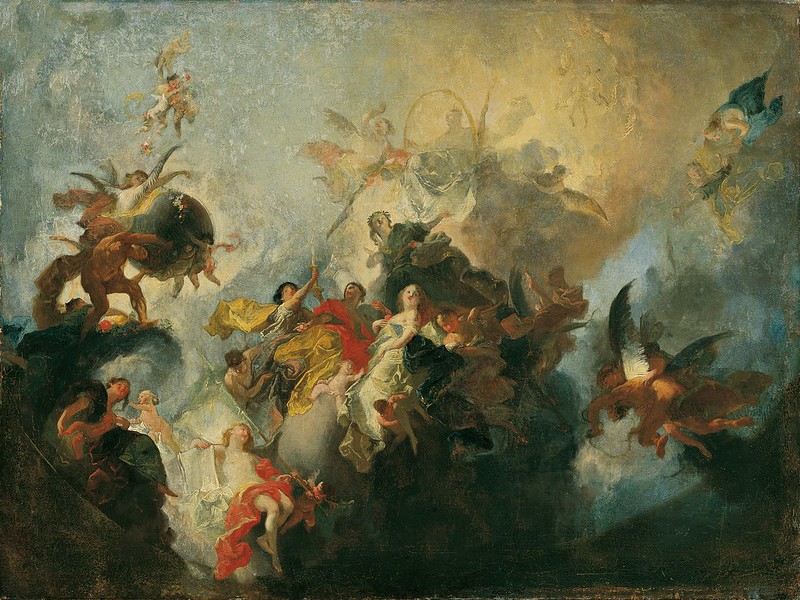Johann Heinrich Rolle (1716-1785)
- Auf, Preiset Gott Mit Vollen Chören
Performers: Mеlаnie Hirsch (Sopran); Marie Hеnriеtte Rеinhold (Alt); Michaеl Zаbаnoff (Tenor); Matthias Viеwеg (Bass);
Kammerchor der Biеdеritzеr Kantorеi; Märkisch Barock; Michael Schοll (Leitung)
Further info: Johann Heinrich Rolle (1716-1785) - Motets
---
German composer. His father, Christian Friedrich Rolle (1681-1751),
wrote several Passions and some chamber music and he was among Bach's
competitors for the Kantorate at the Leipzig Thomaskirche. He was Kantor
at Quedlinburg until 1721, then left for a similar position in
Magdeburg, where he later became city music director. J.H. Rolle
received his early training from his father. He served as organist in
Magdeburg from 1734. He left Magdeburg in 1737, possibly for Leipzig,
where he may have continued his music studies; the claims in his
autobiography, that he studied law at Leipzig and entered into legal
practice in Berlin, are not supported by records at Leipzig University.
In 1741 Rolle, now in Berlin, was engaged as a violinist (later violist)
in Frederick the Great's chapel orchestra. There he became acquainted
with the Bendas, Grauns, Quantz and C.P.E. Bach. Compositions that may
come from this period include an Italian secular cantata, a setting of
Metastasio's Isaaco in German translation, and the birthday cantata
L'apoteoso di Romulo; Rolle's later works reveal the importance of his
contact with the musicians of the Prussian court and with the operas of
Hasse and C.H. Graun. At the same time, Rolle maintained strong
connections with Magdeburg. In 1747 Rolle obtained his dismissal from
Frederick's orchestra and returned to Magdeburg to become organist at
the Johanniskirche. On his father's death in 1751 he was unanimously
appointed to succeed him as city music director, a position he held
until his death. Rolle's main duty in Magdeburg was to provide service
music for the city's six parish churches; a large number of his cantatas
and motets survive in manuscript and printed editions. He was also
required to perform a Passion each year, and to present a new
composition every four or five years. Eight Passion settings are
mentioned in his autobiography, one based on each of the four Gospel
narratives and four on newly written librettos. These works established
Rolle's reputation as a composer of sacred music.
From 1764 on, Rolle participated in a local gathering of intellectuals
known most often as the Mittwochsgesellschaft, started around 1760. Out
of the meetings of this group arose the idea of presenting a series of
public concerts under Rolle's direction. The concerts began in 1764
(after the Seven Years War) and continued until some time after Rolle's
death. Rolle presented his most important compositions, nearly 20
dramatic concert works or ‘musikalische Dramen’, at these ‘öffentliche
Concerte’. Though they have most often been called oratorios, Rolle's
music dramas are a hybrid genre possessing characteristics of both opera
and oratorio. Their subjects are primarily, but not exclusively,
biblical. Some texts show the oratorio's usual bipartite division, but
others consist of one or three parts, depending on dramatic
considerations; the divisions are called parts (Theile) by some
librettists and acts (Handlungen) by others. Like German oratorios,
Rolle's music dramas place great weight on the chorus, and they also
provide the chorus with a dramatic role. Most curious (and revealing)
are the stage directions in Rolle's scores and in the published editions
of the librettos, indicating scenery, costuming and gestures. While
there is no evidence that these works were ever staged, nothing is left
to the imagination of anyone wishing to do so. Rolle was virtually alone
at this time in writing biblical-historical works. His musical style,
often reminiscent of Graun, includes simple melodies full of repeated
diatonic patterns, square phrases, an abundance of parallel 3rds and
6ths, melodic sighs and cadential appoggiaturas. When the text becomes
more violently emotional, however, the music employs disjunct melodic
lines, chromaticism, sudden tonal shifts and unusual harmonies
reminiscent of C.P.E. Bach. Rolle's cousin Christian Carl Rolle
(1725-1788), was Kantor at the Berlin Jerusalemer Kirche; he wrote a
theoretical-didactic treatise, Neue Wahrnehmung zur Aufnahme … der Musik
(Berlin, 1784), including complaints about the fallen state of church
music and biographies of Graun and J.F. Agricola.

Cap comentari:
Publica un comentari a l'entrada